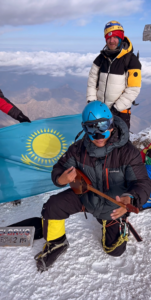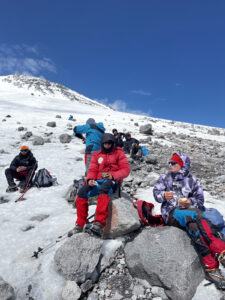ASTANA – Kazakh dombra player Alibek Kaiyrbek recently reached the highest peak in Europe, Mount Elbrus in the Caucasus, where he performed Kurmangazy’s famous kui “Adai” at an altitude of 5,642 meters.

Kaiyrbek performing “Adai“ kui at Mount Elbrus. Photo credit: Kaiyrbek’s personal archieve
The dombra, a revered musical instrument, embodies the history, joy, sadness, courage and freedom of the Kazakh people. More than just a national symbol, it represents Kazakh identity and holds a special place in world music, which is why its sound at such an altitude resonated with very many people.
In an interview with The Astana Times, Kaiyrbek shared the inspiration behind his journey, explaining that the idea to play the dombra at the mountain’s summit began during his student years.
“It had been a long-time dream, but at the beginning of this year, I decided I couldn’t put it off any longer and committed to making it a reality. After securing the necessary resources and meticulously planning every detail, I began my preparations,” he said.
Kaiyrbek, the head of a concert organization at the University of Arts and a dombra player at the Kuanyshbayev Kazakh State Academic Musical Drama Theater in Astana, has toured the world since his early years, promoting Kazakh culture and folk music on the international stage.
For him, the climb was about more than just reaching the top—it was about becoming the first Kazakh dombra player to perform at such an altitude, symbolizing the strength of Kazakh culture and its limitless potential.
“Climbing Elbrus was a serious challenge, and I relied solely on the Almighty, hoping my efforts and preparation would pay off. One of the most memorable moments was performing a solo concert at the camp for tourists, climbers and locals, which became a special highlight of the journey,” recalled Kaiyrbek.

Alpinists taking a break during their journey to Elbrus. Photo credit: Kaiyrbek’s personal archieve
He noted that his concert was warmly received, particularly by local residents, many of whom have a historical connection to Kazakhstan.
“For them, the performance was not just a musical event but something deeply personal and meaningful. The sounds of the dombra awakened memories and a shared connection to our common history,” he said.
Discussing the instrument’s sound at 5,642 meters, where atmospheric conditions impacted the performance, Kaiyrbek described the unexpected challenges.
“The atmospheric pressure stretched the strings, making tuning the instrument difficult,” he said. “The temperature at the summit was extremely low—without gloves, a person can only last 15-20 seconds. Despite the risk of frostbite, I took off my gloves to play. The sound, considering the conditions, turned out quite decent.”
Composition “Adai” is a staple of Kazakh culture, a classic that every dombra player honors. It carries an unbreakable spirit and energy—qualities that resonated with Kaiyrbek on this climb.
“This kui symbolizes the spirit of a warrior clan and reflects strength and resilience. Such qualities were essential for this climb, making the choice deeply symbolic for me. Kazakh culture knows no boundaries, and I believe the world should learn about its beauty and uniqueness,” said Kaiyrbek.

Kaiyrbek’s certificate confirms his achievement of reaching the highest peak in Europe, Mount Elbrus. Photo credit: Kaiyrbek’s personal archieve
He emphasized that this project symbolized not only his personal achievements but also his mission to promote Kazakh culture. He expressed hope that his example would inspire the younger generation to preserve and develop their traditions, learn to play the dombra, and take pride in their cultural heritage.
“In January, right after the New Year, I am planning my next expedition to the highest peak in Africa, Kilimanjaro. There, I will once again perform a kui, continuing my journey to ensure the sounds of our national instrument resonate in the most remote corners of the world,” said Kaiyrbek.
“As for which piece to play on Kilimanjaro, I have not yet decided. I am still exploring my options. It is important that the chosen music captures the spirit of the place and inspires people, as it did on Elbrus. I hope to settle on the right composition during my preparation,” he added.
